June 13th, 2023
Blogs by Doctors
3 Minute Read

Share On Your
Favorite Platform
Favorite Platform

Get Notified of
New Content
New Content





